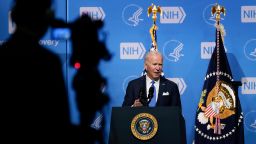South African researchers added new details Tuesday to what’s known about the Omicron variant of coronavirus, confirming that vaccines provide less protection against the new strain but also saying they still see indications that Omicron causes milder symptoms than previous variants.
There seems to be little doubt that Omicron is highly transmissible, and in the US, Centers for Disease Control and Prevention Director Dr. Rochelle Walensky said the new variant now accounts for 3% of samples that are being genetically sequenced.
The spread has been rapid in South Africa, Britain and some other European countries, and health officials are hoping that early indications the virus causes milder disease hold up. Even if that’s the case, however, the sheer number of infections could mean hospitals remain overwhelmed.
Government officials stressed that even if the variants can sneak by some of the protection offered by vaccines, vaccinated people tend to have milder disease or even no symptoms at all when infected – so vaccines remain the No. 1 choice for protecting people. Masks, social distancing and other measures also work.
And Pfizer said it has some new hope to offer, with data showing that its experimental antiviral pill, Paxlovid, cut the risk of hospitalization or death by 89% if given to high-risk adults within a few days of their first symptoms. Pfizer has asked the US Food and Drug Administration for emergency use authorization of the drug, and President Joe Biden said he was encouraged by the data – even as he said it was up to the FDA to decide whether to authorize its use.
“This news provides another potentially powerful tool in our fight against the virus, including the Omicron variant,” Biden said in a statement.
“To make sure that we are ready, my Administration has already placed an order for enough of these pills to treat 10 million Americans,” he added. “Getting vaccinated and getting your booster shot remain the most important tools we have to save lives. But if this treatment is indeed authorized — and once the pills are widely available — it will mark a significant step forward in our path out of the pandemic.”
Dr. Anthony Fauci, director of the National Institute of Allergy and Infectious Diseases, also gushed about the pill.
“The pill is potentially a lifesaver for everyone, vaccinated and unvaccinated people,” Fauci told CNN.
“They’re going to be submitting that to the FDA, and hopefully, we’ll get action on that soon.”
Delta hits hospitals hard
The Delta variant remains the biggest source of trouble as the US neared 800,000 deaths from the virus and Congress held a moment of silence Tuesday. Hospitals in some parts of the country have been overwhelmed with cases. “It feels like you are drinking from a fire hose with no way to control that flow,” Dr. John Hick, an emergency physician at Hennepin Healthcare in Minnesota, said Tuesday.
“I have been practicing for 25 years in the emergency department, and every shift I am working these days is like the worst shift in my career.”
And many patients are hostile, making matters worse, said Dr. Jessi Gold, an assistant professor of psychiatry at Washington University in St. Louis. “Now, people are yelling at you and telling you that you don’t know anything,” she said. “So it’s like a fire hose in a setting that hates you.”
Health leaders said they were dreading the prospect of a fresh wave of Omicron-fueled infections. And World Health Organization Director-General Tedros Adhanom Ghebreyesus said countries should prepare for it. “The reality is that Omicron is probably in most countries, even if it hasn’t been detected yet,” Tedros said at a briefing.
“Omicron is spreading at a rate we have not seen with any previous variant,” he said. “We’re concerned that people are dismissing Omicron as mild. Surely, we have learned by now that we underestimate this virus at our peril,” he added. “Even if Omicron does cause less severe disease, the sheer number of cases could once again overwhelm unprepared health systems.”
Walensky said the US could fight it. “It is more transmissible,” she told NBC News. “And we’re seeing that in other countries as well, that it’s rapidly becoming the more predominant strain. But I want to emphasize that we have the tools now.”
Vaccines would be No. 1, and Fauci said US data to be released Wednesday would largely confirm the news out of South Africa.
“We’re going to be talking about it tomorrow,” Fauci told CNN. “It mostly confirms what you have been hearing that have come from South Africa as well as the UK.
“What happens is that if you get two doses of a Pfizer or a Moderna, the protection against infection itself is dramatically down,” Fauci said. “However, what is the somewhat encouraging news is that the protection against hospitalization and severe disease, although it goes down to around 70% from around 93%, when you get boosted, it brings it back up to the level of pretty good protection.”
He called this a “very strong argument” for people to get boosters.
Restoring immunity with boosters
“Omicron is going to be a challenge because it spreads very rapidly and the vaccines that we use, the regular two-dose mRNA, don’t do very well against infection itself,” Fauci said. “But with hospitalization, particularly if you get the boost, it’s pretty good.”
The two South African studies covered real-world effects of Omicron. One, from Discovery Health, a large health insurance company that covers 3.7 million people in South Africa, examined the medical records of clients during the first three weeks when Omicron was circulating there.
It estimated that the risk of ending up in the hospital from Covid-19 was 29% lower for Omicron infections in adults, compared with the original strain.
Two doses of the Pfizer vaccine were 33% protective against infection overall but 70% effective in preventing severe complications, including hospitalization, the researchers said.
“Our fully vaccinated Pfizer clients were 93% less likely to be admitted to hospital for Covid-19 when Delta was circulating,” Shirley Collie, chief health analytics actuary at Discovery Health, said at a news briefing. “However, now, in the Omicron period, that has reduced to 70%. It is a reduction. However, it does provide substantial protection against hospital admission.”
The team did not examine the effects of booster doses of vaccine. But the data also indicated that Omicron was causing milder infections than other variants.
“You can see very clearly in this Omicron wave, the adult population has a 29% lower risk of admission on a fully risk-adjusted basis relative to the first wave in South Africa,” Dr. Ryan Noach, CEO of Discovery Health, said at the news briefing.
“In the pediatric population under the age of 18, there is a 20% higher admission rate relative to this first wave. Twenty percent may sound significant, but considering that the admission rate itself is low, in real terms, the 20% increase is small and is just a couple of percentage points,” he said.
Plus, patients are not as severely ill as they were in earlier waves of the pandemic, he said.
“At this early point, we believe there is hope the severity is lower,” Noach said.
Richard Friedland, CEO of the private South African hospital network Netcare, told CNN that his company’s hospitals and clinics were seeing similar effects.
“Thus far – and it is very early days – our data over the last 30 days indicates that we are seeing a very mild to moderate form of Covid-19. Many of the cases are asymptomatic,” Friedland said.
“Many of those findings corroborate what we have seen across our network of 49 hospitals, and 10,000 hospital beds, and more than 60 primary care centers across South Africa,” Friedland said. “There is a small cohort of more elderly patients with comorbidities that are being hospitalized, but we don’t yet have evidence that this variant is causing the severe disease which really results in hospitalization and potential death.”
It’s not at all clear that the same pattern will be seen in the US, where fewer people have been exposed to the virus and where vaccination rates linger at a low 60% or so of the population.
Get CNN Health's weekly newsletter
Sign up here to get The Results Are In with Dr. Sanjay Gupta every Tuesday from the CNN Health team.
“Whatever it is, the disease seems to be less severe, whether it’s inherently less pathogenic as a virus or whether there’s more protection in the community, we’re just going to have to see when it comes in the United States,” Fauci told CNN’s Jim Sciutto. “And for sure, Jim, it is going to be dominant in the United States, given its doubling time.”
CNN’s Naomi Thomas and Niamh Kennedy contributed to this report.









